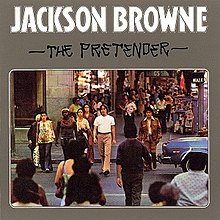The Pretender (album)
| The Pretender | ||||
|---|---|---|---|---|
 |
||||
| Studio album by Jackson Browne | ||||
| Released | November 1976 | |||
| Recorded | 1976 | |||
| Studio |
The Sound Factory (Hollywood, California) |
|||
| Genre | Rock | |||
| Length | 35:07 | |||
| Label | Asylum | |||
| Producer | Jon Landau | |||
| Jackson Browne chronology | ||||
|
||||
| Professional ratings | |
|---|---|
| Review scores | |
| Source | Rating |
| AllMusic | |
| Robert Christgau | (B) |
| The Rolling Stone Album Guide |
|
The Pretender is the fourth album by American singer-songwriter Jackson Browne, released in 1976. It peaked at #5 on Billboard's album chart. The singles from the album were "Here Come Those Tears Again" which reached number 23 and "The Pretender" which peaked at number 58. It was ranked number 391 on Rolling Stone magazine's list of the 500 greatest albums of all time.
The Pretender was released after the suicide of Browne's first wife, Phyllis Major. The album features production by Jon Landau and a mixture of styles.
The Pretender was nominated for a Grammy Award in 1978, but did not win. In 2003, the album was ranked number 391 on Rolling Stone magazine's list of the 500 greatest albums of all time. The Rolling Stone Encyclopedia of Rock & Roll says "its sense of despair is derived in part from the suicide of his first wife, Phyllis, in 1976, two and a half years after the birth of their son, Ethan". The single "Here Come Those Tears Again" was credited as co-written with Nancy Farnsworth, Phyllis Major's mother.
The title track was featured in the 1995 film Mr. Holland's Opus.
The album was certified as a Gold record in 1976 and Platinum in 1977 by the RIAA. It reached Multi-platinum in 1997 and 2006.
In his review for AllMusic William Ruhlmann was equivocal about the album, stating Browne "took a step back from the precipice so well defined on his first three albums, but doing so didn't seem to make him feel any better... The man who had delved so deeply into life's abyss on his earlier albums was in search of escape this time around."
...
Wikipedia
